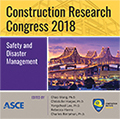Chapter
Mar 29, 2018
New Disasters in the Twittersphere: How Communities Utilize Social Media to Seek and Share Information in the Wake of Induced Seismicity
Authors: Andrew Tracy [email protected], Rudy Klucik, Amy Javernick-Will [email protected], and Cristina Poleacovschi [email protected]Author Affiliations
Publication: Construction Research Congress 2018
Abstract
After many recent disaster events, community members, government officials, and others are increasingly using social media, particularly Twitter, to seek and share hazard-related information. In some states, such as Oklahoma, the frequency of earthquakes has risen significantly in the past decade, with many scientists arguing that these earthquakes are induced by injecting vast quantities of salty wastewater, a byproduct of petroleum production, deep underground. Because the cause of increased seismicity is debated publicly, communities impacted by these quakes often face uncertainty when it comes to understanding the reasons behind earthquakes and the subsequent effects on they will have on their lives. As a result, many community members turn to social media to seek and share information on topics ranging from debating the cause of the earthquakes to safety procedures during an earthquake. This paper seeks to understand how community members use social media to grapple with hazards in this uncertain context by examining how Twitter networks change after a significant hazard event: the magnitude 5.8 Pawnee earthquake in 2016. The paper presents a method that uses web-mining techniques to develop the Twitter network of Edmond, Oklahoma, 1 week leading up to the earthquake, and the week following the quake, and uses social network analysis to examine these data. Our results show that posts discussing the earthquakes, and their purported causes, increase after an event. The overall network also becomes more fractured and disconnected, which runs contrary to theory that would suggest a more densely connected community after a disaster. The method developed to create and analyze community networks from Twitter data can be used to better understand this phenomenon, which will help us better understand how networks change over time, how information is spread through community networks following disasters, and how communities may respond to and discuss contentious infrastructure projects.
Get full access to this article
View all available purchase options and get full access to this chapter.
Information & Authors
Information
Published In
Copyright
© 2018 American Society of Civil Engineers.
History
Published online: Mar 29, 2018
Permissions
Request permissions for this article.
Authors
Affiliations
Dept. of Civil, Environmental, and Architectural Engineering, Univ. of Colorado-Boulder, 1111 Engineering Dr., Boulder, CO 80309-0428. E-mail: [email protected]
Rudy Klucik
Dept. of Electrical, Computer, and Energy Engineering, Univ. of Colorado-Boulder, 1111 Engineering Dr., Boulder, CO 80309-0428.
Dept. of Civil, Environmental, and Architectural Engineering, Univ. of Colorado-Boulder, 1111 Engineering Dr., Boulder, CO 80309-0428. E-mail: [email protected]
Dept. of Civil, Construction, and Environmental Engineering, Iowa State Univ., 402 Town Engineering Bldg., Ames, IA 50011-1066. E-mail: [email protected]
Metrics & Citations
Metrics
Citations
Download citation
If you have the appropriate software installed, you can download article citation data to the citation manager of your choice. Simply select your manager software from the list below and click Download.
View Options
Get Access
Access content
Please select your options to get access
Log in/Register
Log in via your institution (Shibboleth)
ASCE Members:
Please log in to see member pricing
Purchase
Save for later Item saved, go to cart Information on ASCE Library Cards
ASCE Library Cards let you download journal articles, proceedings papers, and available book chapters across the entire ASCE Library platform. ASCE Library Cards remain active for 24 months or until all downloads are used. Note: This content will be debited as one download at time of checkout.
Terms of Use: ASCE Library Cards are for individual, personal use only. Reselling, republishing, or forwarding the materials to libraries or reading rooms is prohibited.
Terms of Use: ASCE Library Cards are for individual, personal use only. Reselling, republishing, or forwarding the materials to libraries or reading rooms is prohibited.
Get Access
Access content
Please select your options to get access
Log in/Register
Log in via your institution (Shibboleth)
ASCE Members:
Please log in to see member pricing
Purchase
Save for later Item saved, go to cart Information on ASCE Library Cards
ASCE Library Cards let you download journal articles, proceedings papers, and available book chapters across the entire ASCE Library platform. ASCE Library Cards remain active for 24 months or until all downloads are used. Note: This content will be debited as one download at time of checkout.
Terms of Use: ASCE Library Cards are for individual, personal use only. Reselling, republishing, or forwarding the materials to libraries or reading rooms is prohibited.
Terms of Use: ASCE Library Cards are for individual, personal use only. Reselling, republishing, or forwarding the materials to libraries or reading rooms is prohibited.
